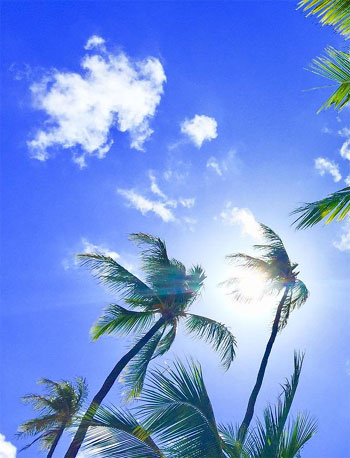
Chapter Seven.
Vancouver International Airport (YVR), Monday, February 4th, 2019;
Hapuna Beach, Hawaii, Monday, February 11th, 2019.
As Robinson and Judy wheeled their suitcases through the busy terminal, the children, dragged along behind, gaped back at the huge totem pole they had just passed. Out of the corner of his eye, Robinson glimpsed a slender, middle-aged man who, he guessed, could have originated from India. The man wore the uniform of a porter, or some such official employee, and pushed an empty luggage cart, of the new ergonomic model, before him. With a smile, he proffered the cart to Robinson, in the process brushing him. Robinson knew YVR carts were free for the taking, so he guessed the man was trolling for a tip. But no, a moment later, the porter was gone. A few seconds' discussion with Judy led to the decision to place the children in the cart, which she could push, while he wheeled the suitcases.
Since about ninety minutes remained until their connecting flight was scheduled to board, once the family had settled near the gate, Robinson answered "an urgent call of nature." While Judy puzzled over his use of this uncharacteristic expression, he found the Men's Room and entered a vacant stall. As expected, in the now unzipped lower left pocket of his cargo shorts was a note, in the form of a folded slip of yellow legal paper. Not completely surprised, he read the hand-printed message:
ALOHA, JOHN. ENJOY THE ISLANDS, AFTER WHICH AWAIT FURTHER
INSTRUCTIONS -- HUNU
Still in the Men's Room, Robinson's smart phone told him that "hunu" is Hawaiian for "ghost." There may also have been a pun: "who knew?" Could Geistmann have been the porter? No, the man had been about the right height, and he had shared Geistmann's wiry build, but his feet were several sizes too small. As far as Robinson knew, small feet could be made to look like big ones, but not vice-versa. His conclusion was that the porter was a messenger, his inference that they would probably not encounter Geistmann, or even his family, in Hawaii. The message was thus straightforward: for the time being, at least, Robinson could relax.
On their third day at lovely Hapuna Beach, Judy was off with the children on "potty patrol" -- i.e. dragging them by their sticky, sandy hands up the beach toward the restrooms, which were alongside the parking area. Suddenly, from the family blanket, John saw a dramatic scene unfolding about a hundred feet from shore.
The scene looked like a combination rescue operation and murder. Robinson quickly extracted the opera glasses from their beach bag -- the glasses were always kept at hand to observe any birds (curlews, plovers, sanderlings), or "birds" (babes), or "hunks" (hunks). Focusing on the pair in the water, he zoomed in for a close-up.
What he saw was a wiry man in a black wetsuit dragging what appeared to be an unconscious blond surfer in red trunks toward the beach. But there was something wrong with the picture. The rescuer had his off-arm wrapped around the victim's throat in what appeared to be a chokehold. Weren't lifeguards supposed to grip victims by the torso, below the armpits? For that matter, where were their boards?
Lowering the glasses so that the strap dangled from his neck, Robinson looked over to the lifeguard chair, about fifty feet to the left of the family blanket. He got another surprise. The bronzed lifeguard was slumped in the chair, apparently asleep. Using the glasses again, Robinson noticed that a large plastic cup had fallen onto the man's lap, and was spilling its contents, some sort of green health drink, all over his red trunks, thereby creating what Robinson irrelevantly perceived as a Christmas effect.
By then, rescuer and victim were only a few yards from shore. But, instead of riding a small wave into the beach, the rescuer unceremoniously dumped his unconscious load in the shallows, and, ducking the incoming waves, swam back out. Five or six Samaritans, Robinson included, soon hauled the unconscious surfer up onto the sand, where one of them began alternately to pump his chest and to administer the kiss of life. (Not Robinson, who was squeamish about this sort of contact.)
By then, Judy was pulling the children toward the crowd that had gatherted around the surfer. Just as she arrived, huffing, and as the children began to gape and point, Robinson's phone, which, for some reason, he still clutched in his hand, buzzed him with a text message. The sender was Mr. Hunu.
Hello, John,
If you're too young to remember those old bodybuilding ads on the backs of comic books, you can still watch one, on You Tube, called "The Man Who Knew Charles Atlas." It will give you the gist of why I had to teach California Blondie a lesson! Will be in touch again soon.
--HUNU
Yes, Robinson was too young, but he had already seen the video, which reprised the famous ad where a bully kicks sand in a skinny guy's face, in front of his girlfriend. After taking the Atlas course, the erstwhile victim cold-cocks the bully, again in front of the girlfriend. Robinson realized that the message he had received at YVR had been Geistmann's latest diversionary tactic. Coupled with the new text, he expected his old friend and adversary to turn up at any moment.
If readers are interested in Reading Geistmann, it is available as a free PDF from the author. Please visit www.ronsinger.net for contact information.
And Geistmann in Africa (Geistman II):

The Piker Press moderates all comments.
Click here for the commenting policy.